Unit 2 I’ll help to clean up the city parks.(Section A 1a-4c)
文档属性
| 名称 | Unit 2 I’ll help to clean up the city parks.(Section A 1a-4c) |
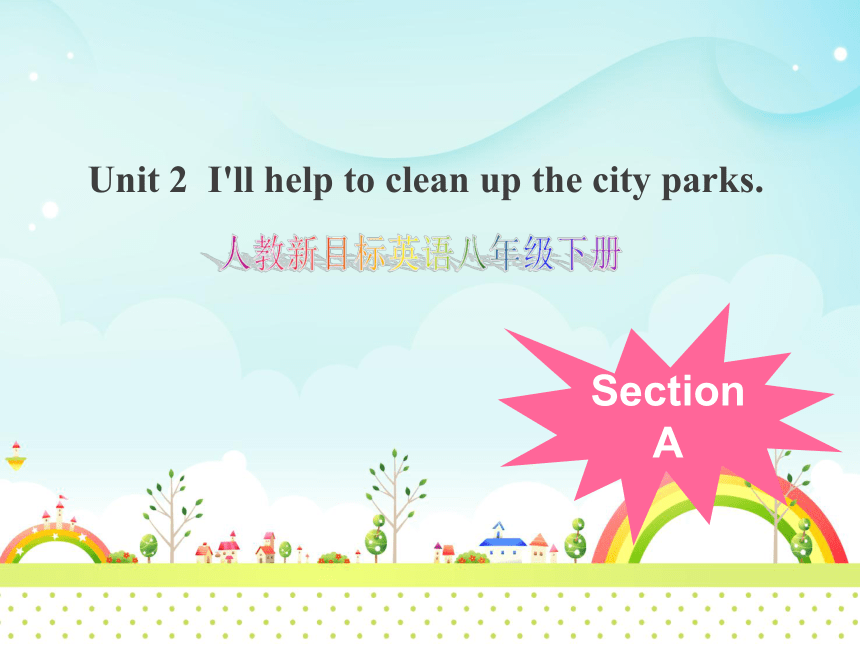
|
|
| 格式 | zip | ||
| 文件大小 | 1.5MB | ||
| 资源类型 | 教案 | ||
| 版本资源 | 人教新目标(Go for it)版 | ||
| 科目 | 英语 | ||
| 更新时间 | 2016-01-04 00:00:00 | ||
图片预览

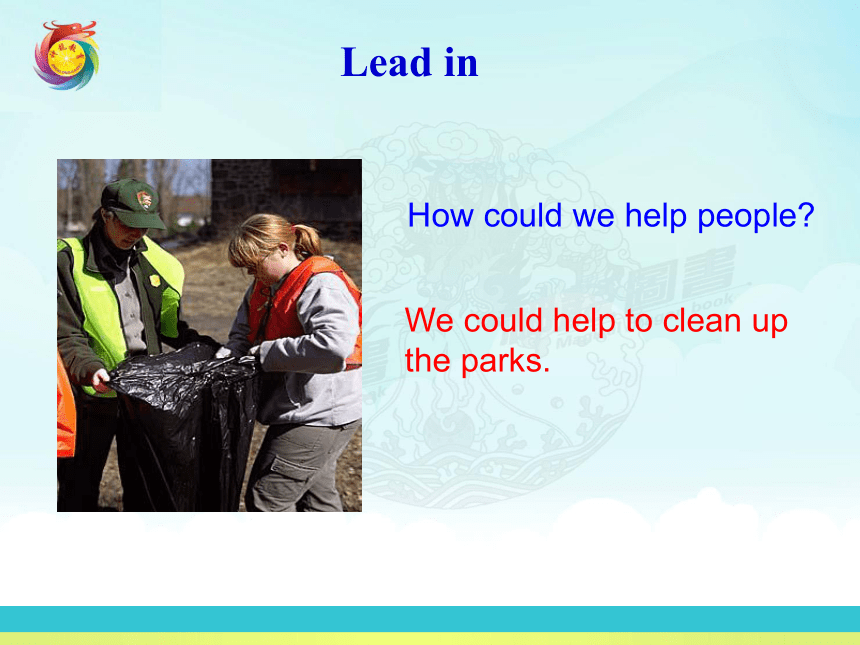
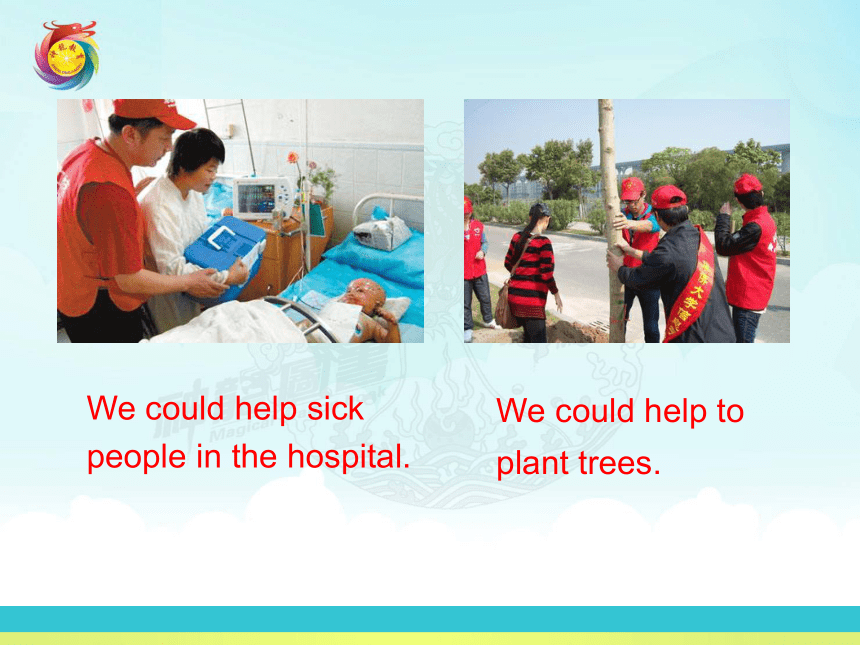
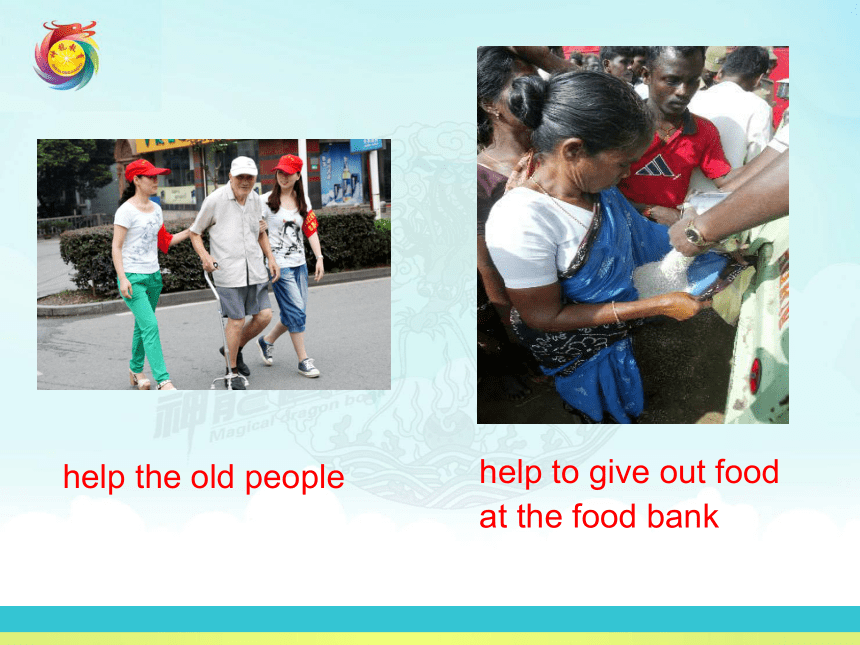
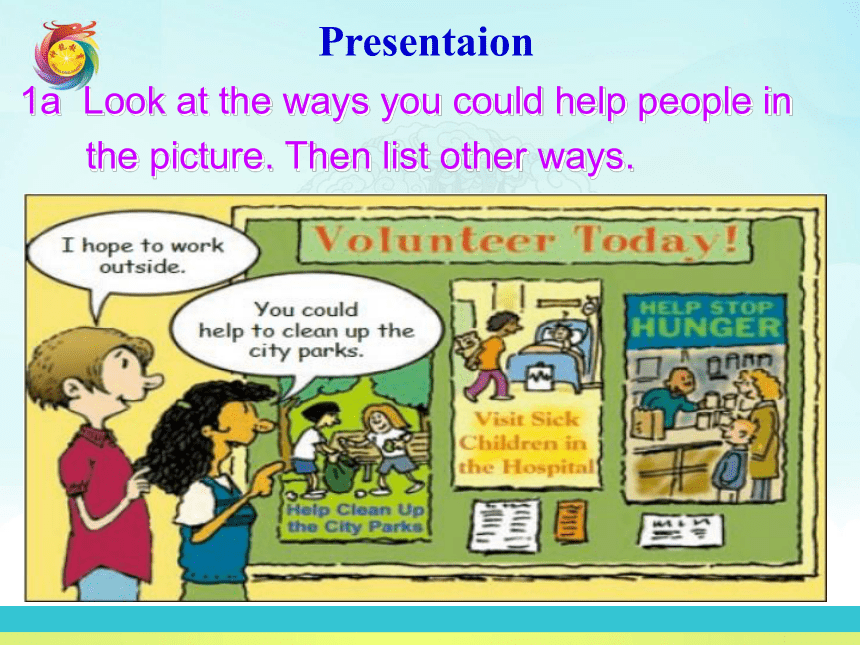
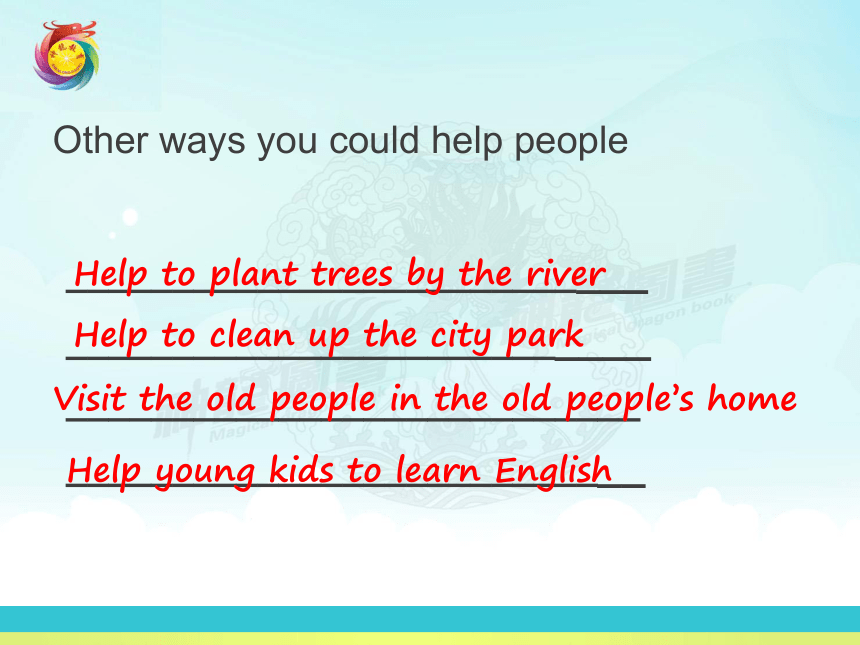
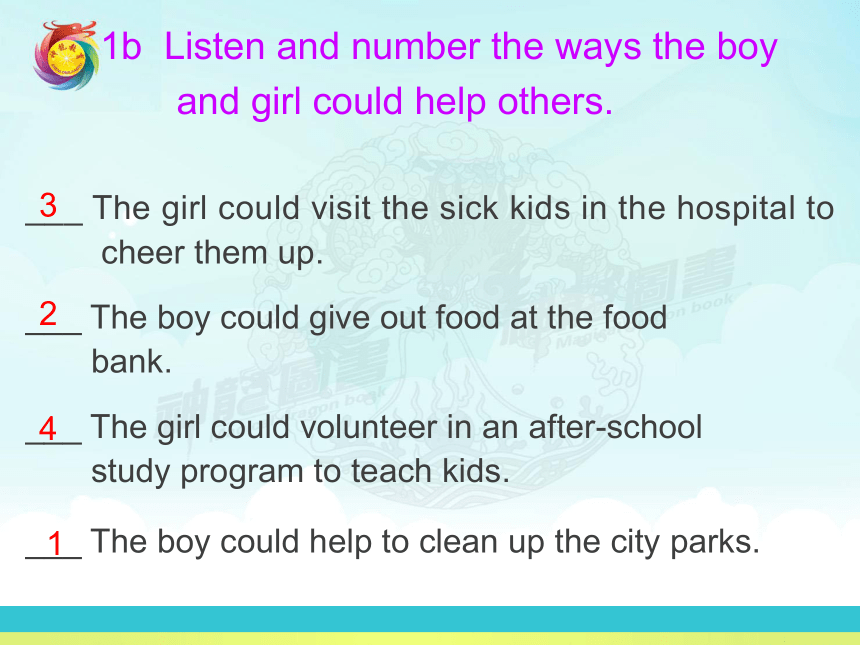
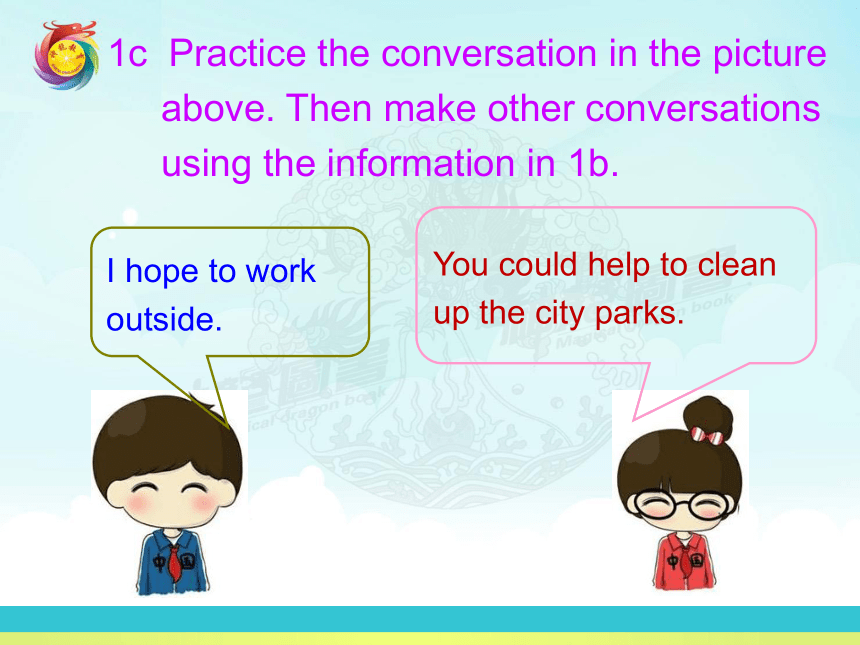
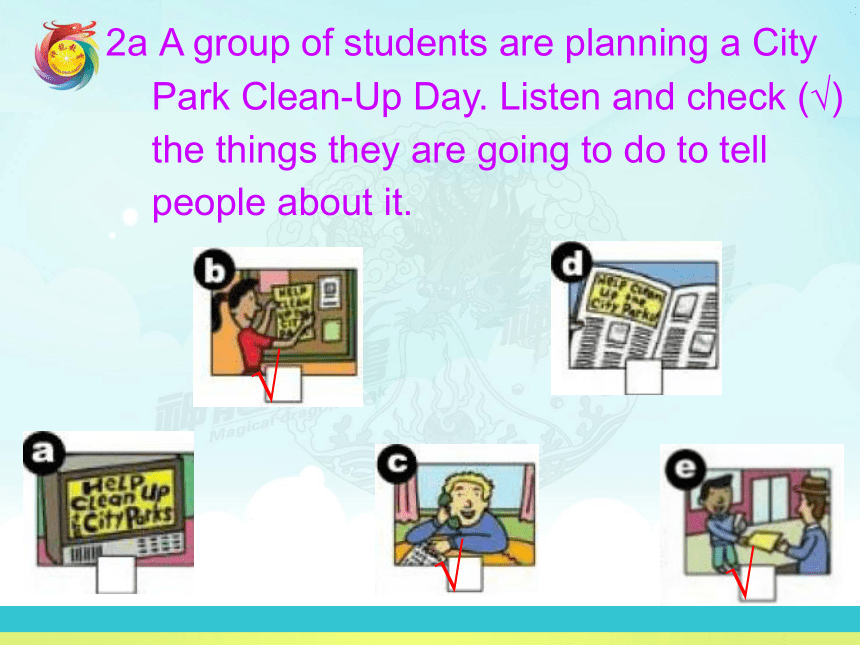
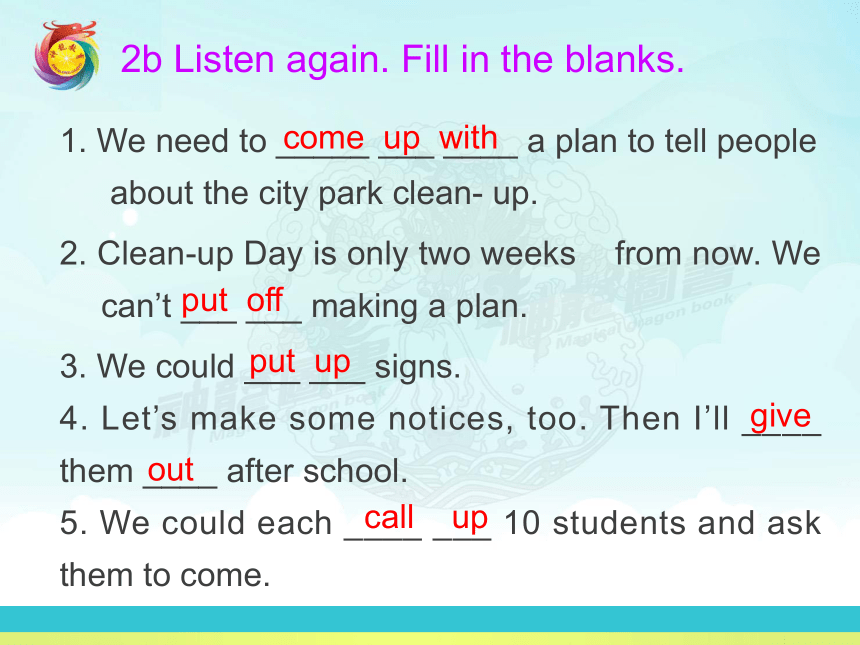
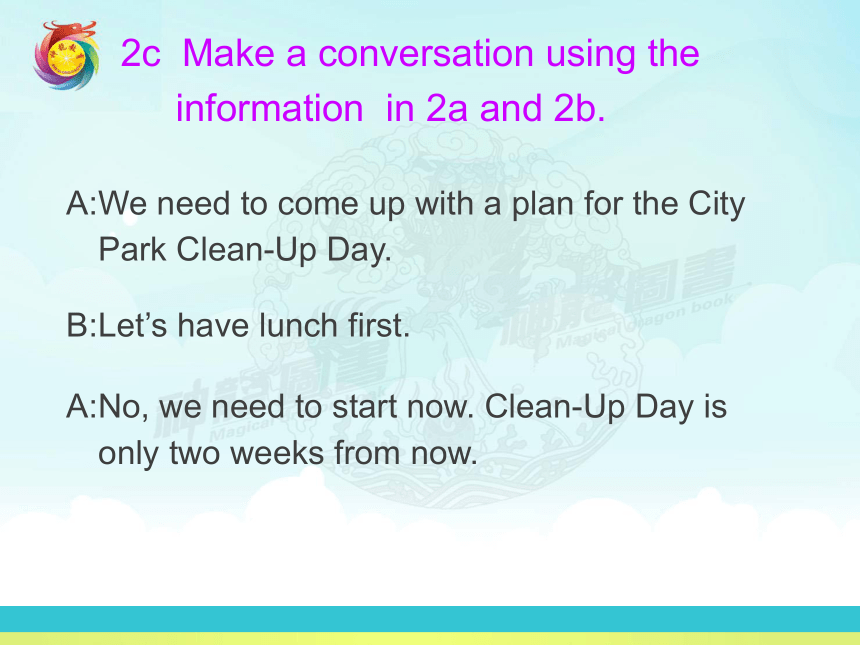
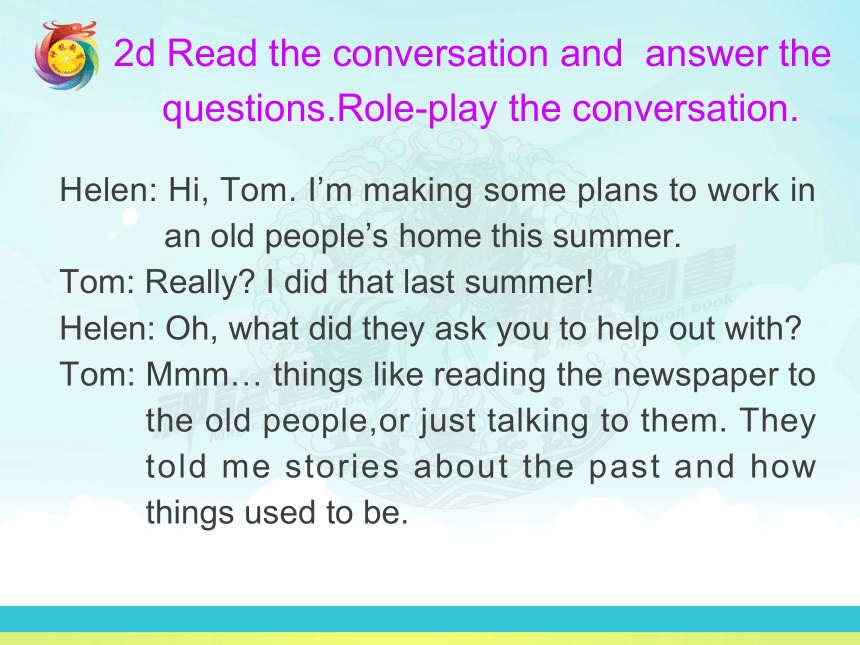
文档简介
课件35张PPT。Unit 2 I'll help to clean up the city parks.
人教新目标英语八年级下册Section A How could we help people?We could help to clean up the parks.Lead inWe could help sick people in the hospital.We could help to plant trees. help the old peoplehelp to give out food at the food bank1a Look at the ways you could help people in the picture. Then list other ways.Presentaion___________________________
___________________________
___________________________
___________________________Other ways you could help peopleHelp to clean up the city parkVisit the old people in the old people’s homeHelp to plant trees by the riverHelp young kids to learn English1b Listen and number the ways the boy and girl could help others. 12341c Practice the conversation in the picture above. Then make other conversations using the information in 1b.I hope to work outside.You could help to clean up the city parks. 2a A group of students are planning a City Park Clean-Up Day. Listen and check (√) the things they are going to do to tell people about it. √√√come up withput offput up2b Listen again. Fill in the blanks. giveoutcall up2c Make a conversation using the information in 2a and 2b.A:We need to come up with a plan for the City Park Clean-Up Day.B:Let’s have lunch first. A:No, we need to start now. Clean-Up Day is only two weeks from now. Helen: Hi, Tom. I’m making some plans to work in an old people’s home this summer.
Tom: Really? I did that last summer!
Helen: Oh, what did they ask you to help out with?
Tom: Mmm… things like reading the newspaper to the old people,or just talking to them. They told me stories about the past and how things used to be.2d Read the conversation and answer the questions.Role-play the conversation.
Helen: That sounds interesting.
Tom: Yeah, a lot of old people are lonely. We should listen to them and care for them.
Helen: You’re right. I mean, we’re all going to be old one day, too.1. Where’s Helen going to work this summer?
2. What did Tom do to help the old people?
She’s going to work in an old people’s home. Reading the newspaper or just talking to the old people. 3a Read the article and answer the questions.1. What does Mario love? He loves animals. 2. What does Mary love?She loves reading books.3. What do Mario and Mary volunteer to do?Mario volunteers at an animal hospital and Mary helps kids learn to read. 3b Read the article again and answer the questions.1. Why does Mario volunteer to help others?
2.Why does Mary volunteer to help others?
3.What does Mario say about volunteering?
4. What does Mary say about volunteering?
1. Why does Mario volunteer to help others?Because he believes it can help him to get his future dream job.
2. Why does Mary volunteer to help others?Because she can do what she loves to do and help others. 3. What does Mario say about volunteering?He gets such a strong feeling of satisfaction when he sees the animals get better and the look of joy on their owners’ faces.4. What does Mary say about volunteering? Volunteering is a dream come true for her.3c Use infinitives to complete the sentences below.1. Mario would like _____ an animal doctor.
2. Mario works for an animal hospital because he wants ________ about how _______ for animals.
3. Mary decided ________ for a job at an after-school reading program last year. She still works there now _______ kids learn to read.
4. Mary has a dream job because she can do what she loves ____________. to beto knowto careto try outto helpto help othersGrammar focus动词不定式用法小结 1. 做动词宾语。常见动词有would
like, want, help, learn, hope,
decide, volunteer。
eg:We don’t want to spent too much
money.
我们不想花费太多钱。
2. 作宾语补足语。常见动词有ask,
want, tell, invite, like, hate。 eg: Mr. Li asked the students to copy
the text.
李老师让学生们抄写课文。作宾语补足语不带to
常见动词有:
使役动词: let, make, have
感官动词: see, watch, hear, feel
3. 作目的状语。eg:Jack turned his head around
to look at people.
杰克转过头看向人群。4. 作后置定语。eg: Claire missed a great chance to
make a lot of money.
克莱尔错过了一个赚大钱的机会。4a Fill in the blanks with the phrase verbs in th boxput up, hand out, call up, cheer up,
come up with, give out, put off1. I want to _______ my plan to work in an animal hospital until next summer. I’m too busy with my studies this year.
2. She hopes to ______ at least five primary schools to ask if they need volunteers for their after-school programs.
call upput off3. Our class is trying to ____________ some ideas to ________ sick children because they are often sad.
4. We decided to ______ signs around the school and ________ notices to tell students about the book sale. We will _______ the money from the sale to homeless people.
put uphand outgive outcome up withcheer upput up, hand out, call up, cheer up,
come up with, give out, put off4b Fill in the blanks with the correct forms of the verbs in th box.help move do make visit spend Most people today are only worried about getting good jobs 1.________ lots of money. In their free time, they think about what 2. ________ for fun. However, few people think about what they can do
3. _________ others. There are many people who are less lucky than us. to maketo do to helpVolunteering our time to help these people is a good way 4.________our free time. For example, we can make plans 5.________sick children in the hospital or raise money for homeless people. Some people even stop doing their jobs for a few months to a year 6.________to another place, like one of the countries in Africa, and help people there.help move do make visit spend to spendto visitto move4c Complete the sentences with your own ideas. Use infinitives.1. I’d like to volunteer _____________________
____________________________________
2. At 12: a.m., I called my friend ____________
____________________________ to help kids with
their homework. to play
soccer together in the afternoon.3. I’m very busy but I could help _____________
_____________________________________
4. Summer vacation is coming, and I
want _________________________________
5. I want to travel alone. My parents
told me (not) ______________________ take the trash out after dinner.to go camping with my friends.not to do that.1. We need to come up with a plan for the City Park Clean-up Day.
我们需要想出一个城市公园清扫日的计划。 (1)need用实义动词,“必要”、“必需”。有人称、数和时态的变化,接名词、代词、动名词或带to的不定式作宾语。
eg:The man needs an English dictionary when he works. 这个人在工作时需要一本英语词典。
Do you need to see him yourself?
你必需亲自见他吗?Language Points(2)clean up “打扫;清理”。如果在clean和up间加个连字符号, 它就是名词了, 意为“扫除”。
eg: You must give your classroom a good clean-up.
你必须对教室进行彻底地打扫。(3)come up with 提出(观点,看法)。
eg: He has?come up with?a great idea. 他想出了一个绝好的办法。
I came up with a better plan than that.?
我提供了一个比那还好的计划。2. They told me stories about the past and how things used to be.
他们给我讲了关于过去的故事一季过去是什么样子的。
used to do sth. 过去常常做某事 ,表示过去习惯性、经常性的动作或状态,暗指现在已经不存在。used无人称和时态的变化。
eg:I used to go to the Youth Center. But I have no time now.
我过去经常去青少年中心,但现在我没有时间了。3. Yeah, a lot of old people are lonely.
是的,很多老人很寂寞。
lonely adj. 孤独的;寂寞的。指精神上感觉孤独、寂寞。eg: The old man feels lonely, so he raises a dog.
那名老人觉得很孤独,因此他养了一只狗。 Write three conversations about your discussions with your classmates. A: I’d like to help the old.
What could I do?
B: You could give them medical service.Homework
人教新目标英语八年级下册Section A How could we help people?We could help to clean up the parks.Lead inWe could help sick people in the hospital.We could help to plant trees. help the old peoplehelp to give out food at the food bank1a Look at the ways you could help people in the picture. Then list other ways.Presentaion___________________________
___________________________
___________________________
___________________________Other ways you could help peopleHelp to clean up the city parkVisit the old people in the old people’s homeHelp to plant trees by the riverHelp young kids to learn English1b Listen and number the ways the boy and girl could help others. 12341c Practice the conversation in the picture above. Then make other conversations using the information in 1b.I hope to work outside.You could help to clean up the city parks. 2a A group of students are planning a City Park Clean-Up Day. Listen and check (√) the things they are going to do to tell people about it. √√√come up withput offput up2b Listen again. Fill in the blanks. giveoutcall up2c Make a conversation using the information in 2a and 2b.A:We need to come up with a plan for the City Park Clean-Up Day.B:Let’s have lunch first. A:No, we need to start now. Clean-Up Day is only two weeks from now. Helen: Hi, Tom. I’m making some plans to work in an old people’s home this summer.
Tom: Really? I did that last summer!
Helen: Oh, what did they ask you to help out with?
Tom: Mmm… things like reading the newspaper to the old people,or just talking to them. They told me stories about the past and how things used to be.2d Read the conversation and answer the questions.Role-play the conversation.
Helen: That sounds interesting.
Tom: Yeah, a lot of old people are lonely. We should listen to them and care for them.
Helen: You’re right. I mean, we’re all going to be old one day, too.1. Where’s Helen going to work this summer?
2. What did Tom do to help the old people?
She’s going to work in an old people’s home. Reading the newspaper or just talking to the old people. 3a Read the article and answer the questions.1. What does Mario love? He loves animals. 2. What does Mary love?She loves reading books.3. What do Mario and Mary volunteer to do?Mario volunteers at an animal hospital and Mary helps kids learn to read. 3b Read the article again and answer the questions.1. Why does Mario volunteer to help others?
2.Why does Mary volunteer to help others?
3.What does Mario say about volunteering?
4. What does Mary say about volunteering?
1. Why does Mario volunteer to help others?Because he believes it can help him to get his future dream job.
2. Why does Mary volunteer to help others?Because she can do what she loves to do and help others. 3. What does Mario say about volunteering?He gets such a strong feeling of satisfaction when he sees the animals get better and the look of joy on their owners’ faces.4. What does Mary say about volunteering? Volunteering is a dream come true for her.3c Use infinitives to complete the sentences below.1. Mario would like _____ an animal doctor.
2. Mario works for an animal hospital because he wants ________ about how _______ for animals.
3. Mary decided ________ for a job at an after-school reading program last year. She still works there now _______ kids learn to read.
4. Mary has a dream job because she can do what she loves ____________. to beto knowto careto try outto helpto help othersGrammar focus动词不定式用法小结 1. 做动词宾语。常见动词有would
like, want, help, learn, hope,
decide, volunteer。
eg:We don’t want to spent too much
money.
我们不想花费太多钱。
2. 作宾语补足语。常见动词有ask,
want, tell, invite, like, hate。 eg: Mr. Li asked the students to copy
the text.
李老师让学生们抄写课文。作宾语补足语不带to
常见动词有:
使役动词: let, make, have
感官动词: see, watch, hear, feel
3. 作目的状语。eg:Jack turned his head around
to look at people.
杰克转过头看向人群。4. 作后置定语。eg: Claire missed a great chance to
make a lot of money.
克莱尔错过了一个赚大钱的机会。4a Fill in the blanks with the phrase verbs in th boxput up, hand out, call up, cheer up,
come up with, give out, put off1. I want to _______ my plan to work in an animal hospital until next summer. I’m too busy with my studies this year.
2. She hopes to ______ at least five primary schools to ask if they need volunteers for their after-school programs.
call upput off3. Our class is trying to ____________ some ideas to ________ sick children because they are often sad.
4. We decided to ______ signs around the school and ________ notices to tell students about the book sale. We will _______ the money from the sale to homeless people.
put uphand outgive outcome up withcheer upput up, hand out, call up, cheer up,
come up with, give out, put off4b Fill in the blanks with the correct forms of the verbs in th box.help move do make visit spend Most people today are only worried about getting good jobs 1.________ lots of money. In their free time, they think about what 2. ________ for fun. However, few people think about what they can do
3. _________ others. There are many people who are less lucky than us. to maketo do to helpVolunteering our time to help these people is a good way 4.________our free time. For example, we can make plans 5.________sick children in the hospital or raise money for homeless people. Some people even stop doing their jobs for a few months to a year 6.________to another place, like one of the countries in Africa, and help people there.help move do make visit spend to spendto visitto move4c Complete the sentences with your own ideas. Use infinitives.1. I’d like to volunteer _____________________
____________________________________
2. At 12: a.m., I called my friend ____________
____________________________ to help kids with
their homework. to play
soccer together in the afternoon.3. I’m very busy but I could help _____________
_____________________________________
4. Summer vacation is coming, and I
want _________________________________
5. I want to travel alone. My parents
told me (not) ______________________ take the trash out after dinner.to go camping with my friends.not to do that.1. We need to come up with a plan for the City Park Clean-up Day.
我们需要想出一个城市公园清扫日的计划。 (1)need用实义动词,“必要”、“必需”。有人称、数和时态的变化,接名词、代词、动名词或带to的不定式作宾语。
eg:The man needs an English dictionary when he works. 这个人在工作时需要一本英语词典。
Do you need to see him yourself?
你必需亲自见他吗?Language Points(2)clean up “打扫;清理”。如果在clean和up间加个连字符号, 它就是名词了, 意为“扫除”。
eg: You must give your classroom a good clean-up.
你必须对教室进行彻底地打扫。(3)come up with 提出(观点,看法)。
eg: He has?come up with?a great idea. 他想出了一个绝好的办法。
I came up with a better plan than that.?
我提供了一个比那还好的计划。2. They told me stories about the past and how things used to be.
他们给我讲了关于过去的故事一季过去是什么样子的。
used to do sth. 过去常常做某事 ,表示过去习惯性、经常性的动作或状态,暗指现在已经不存在。used无人称和时态的变化。
eg:I used to go to the Youth Center. But I have no time now.
我过去经常去青少年中心,但现在我没有时间了。3. Yeah, a lot of old people are lonely.
是的,很多老人很寂寞。
lonely adj. 孤独的;寂寞的。指精神上感觉孤独、寂寞。eg: The old man feels lonely, so he raises a dog.
那名老人觉得很孤独,因此他养了一只狗。 Write three conversations about your discussions with your classmates. A: I’d like to help the old.
What could I do?
B: You could give them medical service.Homework
同课章节目录
- Unit 1 What's the matter?
- Section A
- Section B
- Unit 2 I'll help to clean up the city parks.
- Section A
- Section B
- Unit 3 Could you please clean your room?
- Section A
- Section B
- Unit 4 Why don't you talk to your parents?
- Section A
- Section B
- Unit 5 What were you doing when the rainstorm came
- Section A
- Section B
- Review of Units 1-5
- Unit 6 An old man tried to move the mountains.
- Section A
- Section B
- Unit 7 What's the highest mountain in the world?
- Section A
- Section B
- Unit 8 Have you read Treasure Island yet?
- Section A
- Section B
- Unit 9 Have you ever been to a museum?
- Section A
- Section B
- Unit 10 I've had this bike for three years.
- Section A
- Section B
